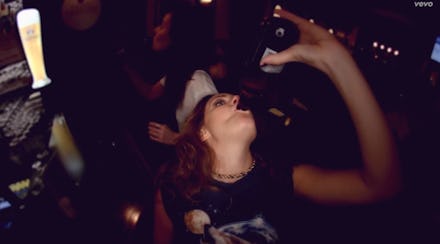Science Shows That Pop Music Is Actually Brainwashing Kids to Drink

It turns out the music we listen to has a significant and measurable impact on our drinking habits. A recent study conducted by Dartmouth College and the University of Pittsburgh showed that teenagers who like songs with explicit alcohol references are two to three times more likely to engage in binge drinking than teenagers who aren't familiar with booze-addled pop.
That's a huge problem, and few are talking about it.
Researchers found that adolescents who drank were far better able to recall alcohol brands name-checked in pop songs. The correlation, in fact, was as strong between those factors as between brand recall and the influence of parental and even peer drinking.
The scope of the problem, then, is massive. Teenagers are exposed to around 2.5 hours of music a day, and in that time are hit with an average of eight alcohol brand mentions, the biggest four being Patrón, Hennessy, Grey Goose and Jack Daniel's. What's worse, these companies all clearly understand the strength of the connection between alcohol and music. They sponsor artists and festivals, host concerts and commission music from all the biggest acts to help tap the impulse control scientists have only recently uncovered.
But there have been clear signs that this was a problem well before this study. Additional research has found that listening to music with frequent alcohol references in social settings will cause listeners to drink faster and drink more than they would if listening to similar music without these same explicit references. Lyrical content aside, the sonic qualities of music can also influence the way we drink in social settings. Up-tempo music increases the body's arousal and causes people to drink faster. Music that's louder does the same, and anyone who's even somewhat familiar with pop's current loudness war knows that all our music is getting a lot louder.
It's clear, then, why this has become an industry rule: Every pop song that wants to be a hit needs at least one reference to alcohol. Efforts range from Beyoncé's orgiastic "Drunk in Love" to the ecstatic "Turn Down for What," or Tove Lo's new banger about hangovers, "Habits," currently No. 13 and climbing on the Billboard Hot 100. On the other hand, Justin Bieber (who is 20) recently made a very demonstrative public announcement that he's quitting drinking because it's compromising his musical output.
It's clear that pop music has a drinking problem, and because it does, the rest of us might not be far behind.